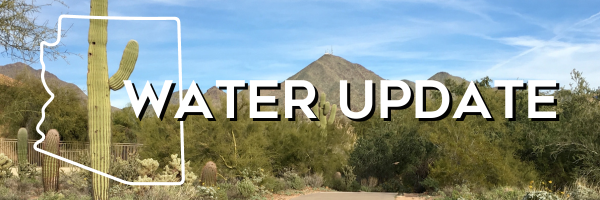Arizona is NOT Running Out of Water
Water usage and availability is a hot topic in Arizona. I recently attended two water summit events – one held by the Scottsdale Association of Realtors featuring a panel of state and local experts and another event featuring the Deputy Water Services Director from the City of Phoenix. I learned quite a lot and left very encouraged. Here are some of my key take-aways:
- I heard loud and clear that we are NOT going to run out of water in Arizona. Period.
- While our population continues to grow, Arizona’s water use has remained fairly stable for the last 50+ years due to innovation and conservation.
- Arizona gets 40% of our water from the Colorado River, 40% from groundwater, 17% from in-state rivers, and 3% from reclaimed water.
- The Colorado River supplies water to 7 states. Long-term drought conditions, plus climate change (warmer temps), has resulted in historic low levels at the two biggest reservoirs. Last year, the federal government essentially told the affected states to work together to come up with a solution or they would. There was a 3-year solution agreed to in May of this year.
- Groundwater is the other major source of water and Governor Katie Hobbs recently announced restrictions on new residential subdivisions (new construction) that rely on groundwater to demonstrate the required 100-year water supply. Rest assured that we will continue to grow and this change will drive innovation.
- 73% of water in Arizona is used by agriculture, 21% is used by municipalities, and 6% is industrial use.
- If you’re wondering why we don’t have residential restrictions in place limiting water use, the short answer is that voluntary efforts are working. That said, we ALL need to continue to do our part.
How You Can Help
Hopefully by now, you’re thinking about ways you may be able to save water. Here are some ideas for consideration:
- The vast majority of residential water use is outdoors and most people overwater their landscape. Experts suggest watering no more than twice per week. Water deeply and slowly so it has time to soak in, and water at night so there is less evaporation. Adjust your watering levels by season or even by month and if you have grass and it’s not being used by children or pets, covert it desert plantings.
- Check for water leaks in your home (inside and out) four times per year. Fix them right away. You’d be surprised how much this can help.
- When you replace appliances, faucets, etc. look for ones that have either EPA WaterSense or Energy STAR rated labels.
- Install smart devices such as smart irrigation controllers, soil moisture meters, and smart leak detectors.

 Facebook
Facebook
 X
X
 Pinterest
Pinterest
 Copy Link
Copy Link
